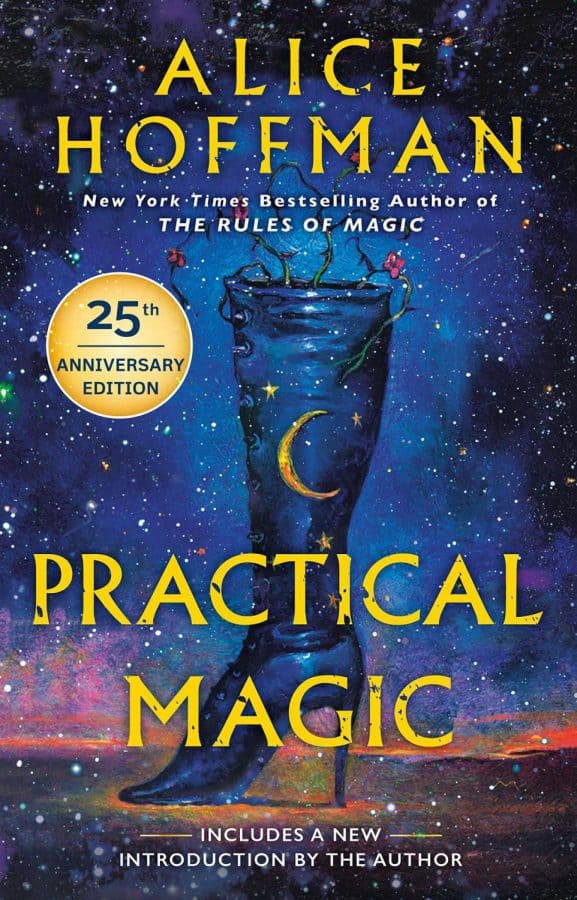Culture Pick | “Practical Magic” is a popcorn movie
July 14, 2021
Griffin Dunne’s 1998 film “Practical Magic” is a “popcorn movie.” It’s not exactly life-changing or even intellectually stimulating, but it’s fun to watch, especially if you’re a fan of magic or strong sisterly bonds. The film is a guilty pleasure of mine, and considering its cult status, it’s a favorite among others as well.
Imagine my surprise upon reading Alice Hoffman’s novel and discovering that the source material is not nearly as “feel-good” as its adaptation. In fact, it’s much darker.
The story centers around the Owens sisters, Sally and Gillian, played in the film by Sandra Bullock and Nicole Kidman. After losing their parents, they move to a small Massachusetts town to live with their great-aunts, Frances and Bridget, who are portrayed by Stockard Channing and Dianne Wiest in the movie.
The aunts are witches, and so are Sally and Gillian. For this reason, their family is infamous among the townspeople.
According to the book’s very first line, which also serves as opening narration for the film, “For more than two hundred years, the Owens women have been blamed for everything that has gone wrong in town.”
This minor setback doesn’t stop women in the town from secretly going to the aunts for help, though. Frances and Bridget sometimes perform spells for people, particularly for women seeking solutions to relationship problems. While the novel offers a better explanation for these secret meetings, the film includes a scene where the aunts perform a love spell for a woman who wants a man to leave his wife for her.
The family’s “witchy” reputation doesn’t inhibit Gillian’s popularity, particularly with men, who are drawn to her beauty. This hypnotic quality is something that Sally and even the aunts seem to possess, at least in the novel.
Some men are inexplicably attracted to Owens women. The explanation for this is ambiguous, though I’m inclined to believe it’s part of their supernatural charm.
For instance, in the book, Gillian causes traffic jams because of a short skirt she wears, which seems too sensational not to be magical. At any rate, the magical aspect provides a reasonable explanation for why the characters fall in love so quickly.
Although Owens women find romance easily, Sally and Gillian’s relationship with each other is frequently tested.
Aside from other difficulties, the sisters grew up to be very different from each other. Sally resents magic and is desperate to fit in. She’s responsible, strict and afraid to fall in love, while Gillian relies on magic and doesn’t care what others think of her. She is free-spirited, impulsive and a heartbreaker.
In both the novel and the film, the girls’ contrasting personalities are exemplified by their different reactions to the love spell the aunts perform for the woman mentioned earlier.
The spell requires the woman to kill a dove, and the animal’s death, along with the woman’s desperation for a man she can’t have, are both things that Sally and Gillian carry into their adulthoods. Sally vows never to love a man in that way. Gillian, on the other hand, cannot wait to fall in love.
Eventually, Gillian decides to leave Massachusetts so she can see what life is like beyond the town. Meanwhile, Sally stays behind. Despite what she promised her younger self, Sally meets and marries a man named Michael, with whom she has two daughters, Antonia and Kylie.
Years pass, and the sisters’ lives begin to unravel. Gillian, after a series of failed relationships, becomes involved with an abusive man named Jimmy. Then Michael dies after being struck by a car, and Sally takes it upon herself to raise her children.
At this point, the film’s storyline diverges from the book.
In Hoffman’s novel, Sally and her children move to New York so they can escape the memory of Michael’s death, as well as the Owenses’ reputation as witches. It’s there that Gillian shows up unexpectedly at their front door, having accidentally killed Jimmy in a drug overdose.
Afraid of her sister going to prison, Sally helps bury his body in the backyard. The rest of the novel focuses on the sisters trying to keep this secret while also struggling to fix their fractured relationship.
In the movie, Sally and her daughters stay in Massachusetts and move in with the aunts after Michael’s death. This doesn’t make sense, especially considering Sally’s desire to escape her heritage and keep her children from learning witchcraft.
Despite this inconsistency, I will admit that I prefer the small-town Massachusetts setting to the New York suburbs in the book. Massachusetts seems better suited for the story.
Later on, Gillian calls Sally to come pick her up at a motel, where they’re abducted by Jimmy.
In the end, Jimmy winds up dead. In an attempt to avoid legal trouble, they resurrect him using a forbidden spell from the aunts’ grimoire, but then he attacks Gillian, and Sally is forced to kill him — again. Like in the novel, the sisters decide to call it a day and bury him in the backyard.
Hoffman’s characters are more fleshed out than their movie counterparts.
Sally struggles with abandonment issues and is terrified of her children growing up and leaving her. Antonia and Kylie feel smothered by their mother and are jealous of each other’s looks. Gillian questions her own self-worth and is traumatized by the abuse she suffered at Jimmy’s hands.
Multiple relationship plotlines are absent from the film. I think the movie watered down many of them so it could focus on the bond between Sally and Gillian. Surprisingly, I don’t mind most of these changes.
Aside from Jimmy’s death, the only remaining plot line from the book that makes an appearance in the film is the whirlwind romance between Sally and Gary Hallet, a detective who comes to town to investigate Jimmy’s disappearance. I mean, it’s a Sandra Bullock movie from the ‘90s. Of course they’re going to keep the love interest for the leading lady.
The only character I miss from the novel is Ben, Gillian’s love interest. It was sweet to see their budding romance, especially after everything Gillian’s been through.
However, I think the performances of Sandra Bullock and Nicole Kidman more than make up for Ben’s absence. There’s nothing I love more than seeing a strong bond between sisters. The spell Bullock and Kidman cast on the audience — pun very much intended — makes us believe they could be related.
In Hoffman’s novel, their relationship isn’t nearly as satisfying. The sisters are always at each other’s throats, and not in a fun or comedic way. Granted, it’s a realistic depiction of siblings who have been estranged for years, but if I’m being honest, it’s a little tiring to read about yet another pair of fictional siblings who don’t get along.
Oh, and there’s also a curse, but only in the movie.
The curse, accompanied by the sound of a deathwatch beetle, causes the death of any man who falls in love with an Owens woman, meaning that serious relationships will always end in tragedy for them. This explains Michael’s death, and it also explains why the sisters seem to struggle with their love lives.
Though Sally hears the deathwatch beetle some time before her husband’s death in the novel, it’s never confirmed that a curse or the beetle was the cause. The event seemed more like nature trying to warn Sally of what would happen, but she ignored the signs due to her prejudice against magic.
This is an aspect of the novel that I liked more than the movie. Hoffman doesn’t feel the need to provide a supernatural reason for why the Owenses’ relationships don’t work out. They just don’t, and that’s how life is sometimes. The curse’s absence in the book grounds it more in reality and makes the Owenses feel like actual people with actual problems.
The book offers more insightful commentary on family and heritage. Sally tries over and over to escape her past, and she must gradually learn to accept herself. She comes to terms with the fact that she and her family are witches, and there’s nothing she can do about it.
Though the film’s characters lack the characters’ depth from the book, I think the casting helps in this regard. As previously stated, Bullock and Kidman are great, but Channing and Wiest are equally wonderful as the aunts, even though they differ from the novel.
Channing is entirely convincing as Frances, a wise woman who’s rough around the edges but soft when it comes to her great-nieces; Wiest as Bridget is lovably sweet, providing a sense of warmth and comfort whenever she’s onscreen.
All in all, if you love the film, then the book probably won’t be your cup of tea, and vice versa. If you’re dead set on consuming both versions, then I would recommend reading Alice Hoffman’s novel before jumping into the movie, especially since it’s not as light or easily digestible.
If forced to choose, I would go with the movie.





















